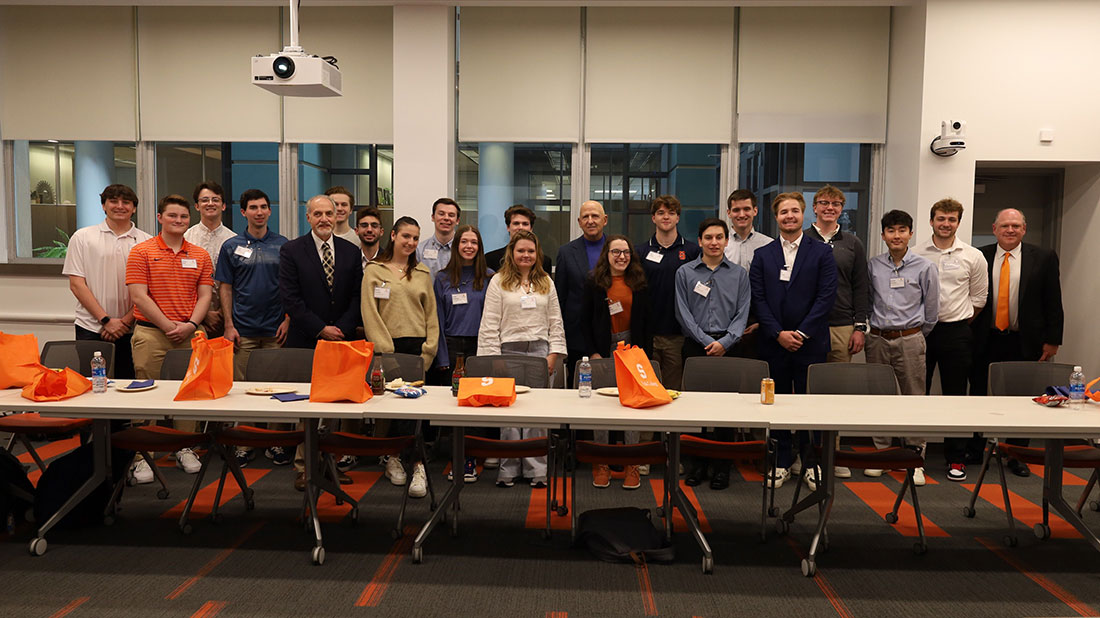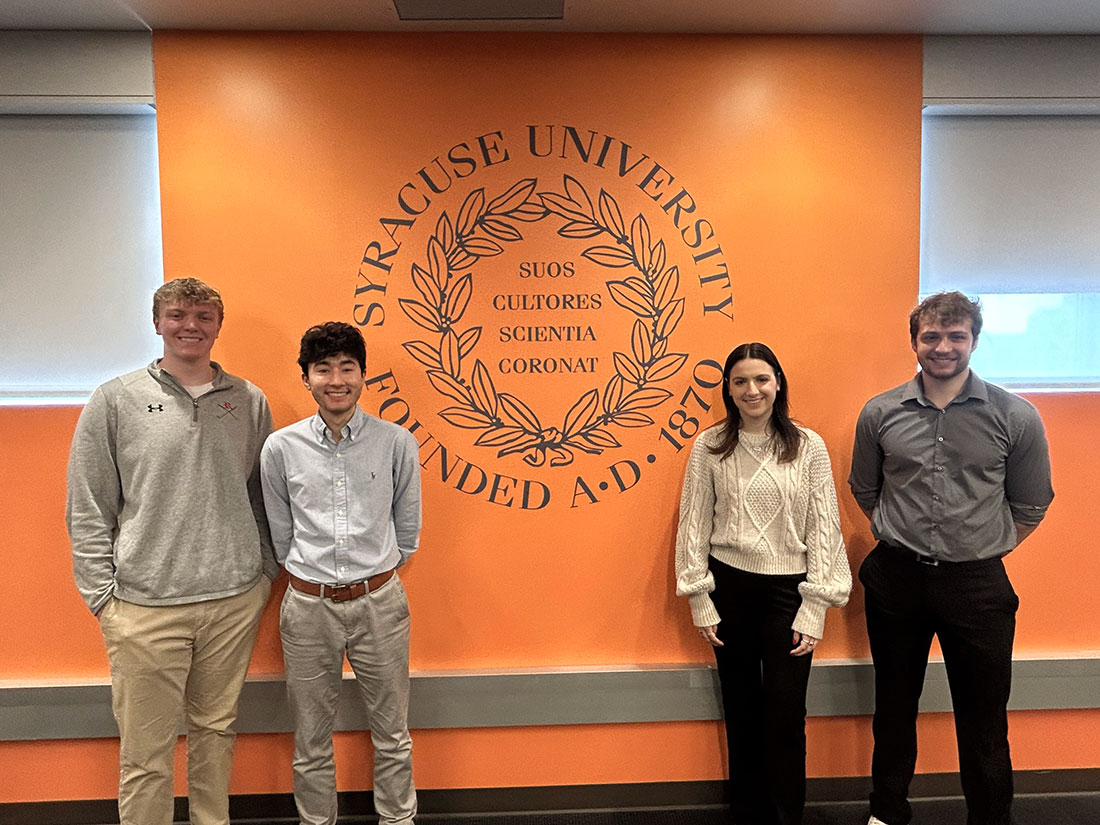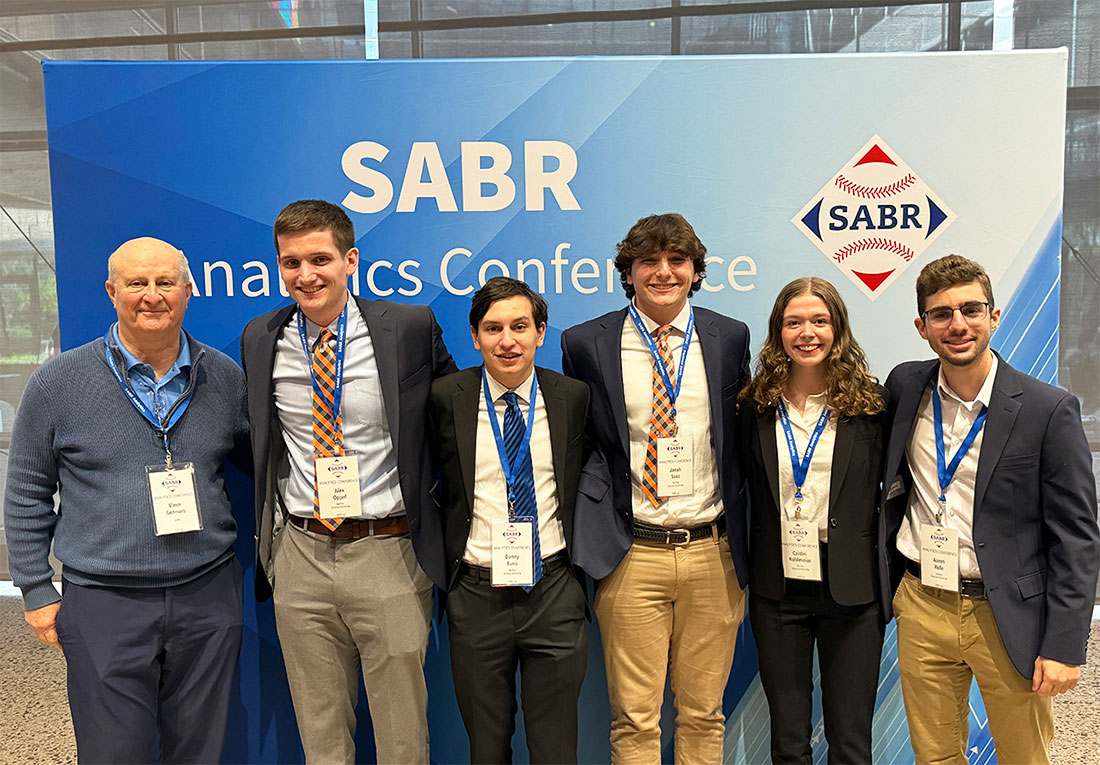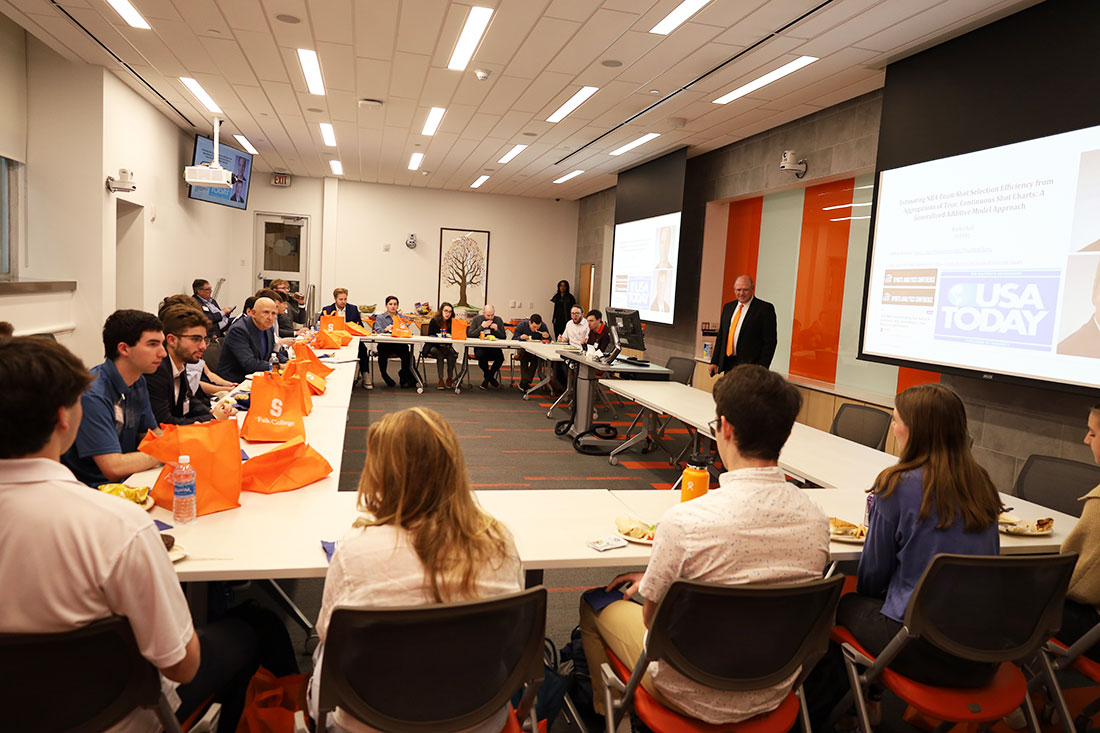
Rodney Paul, the director of the Sport Analytics program at Syracuse University, says two of the key cornerstones of the program are research and competition.
“Our students diligently work on research and internal competitions during their classroom activities, various sport analytics clubs, and individual research projects,” says Paul, a professor in the Department of Sport Management in the Falk College of Sport and Human Dynamics. “We pride ourselves on being willing to compete with anyone at any time and to show off our work in competitive settings.”
This semester, sport analytics students and faculty have had a lot to show off.
From player and team analytics competitions in basketball, football, and baseball to the National Sport Analytics Championship to the presentation of research at prestigious conferences, the Sport Analytics program showcased students and faculty at competitions throughout the country.
In mid-April, Falk College benefactor and noted sports agent David Falk hosted a reception for many of the sport analytics students who participated in the competitions this year. Falk, who has long been recognized as one of the sport industry’s leading figures and most talented innovators, compared the students’ achievements to a Major League Baseball player’s most coveted feat: Winning the triple crown (leading the league in batting average, home runs and RBI).
“At Syracuse, you guys have won the analytics triple crown: baseball, football, and basketball,” Falk said. “To me, that’s beyond incredible. This program, in my opinion – and our chancellor (Kent Syverud) knows how I feel – is the crème de la crème of what Syracuse University can offer.”
Sport analytics major Danny Baris, who won two undergraduate paper competitions, says the curriculum is designed to prepare students to excel at these events.
“The main advantage that I think the sport analytics program gives us is that our curriculum mainly focuses on usable skills rather than theory,” Baris says. “This makes what we learn in the classroom very applicable in these competitions. The program also places a heavy emphasis on presentation skills, and one thing that has set us apart in many of these competitions is presentation quality.”
Paul agrees that the key to the program’s success – and the key to graduates finding desired jobs in the sports industry – is this emphasis on marketable skills.
“High level mathematics and statistics, intense coding and statistical modeling, a wide overview of key economic and business theories and models, a focus on effective communication, and a foreign language requirement span across a wide range of jobs and careers in many industries in today’s society and into the future,” Paul says. “We just happen to study and apply these topics to the fascinating world of sports.”
Here’s a look at the Sport Analytics program’s success this spring:

Back-to-Back
In late February, a team of four sport analytics students captured Syracuse University’s second consecutive title in the AXS National Collegiate Sports Analytics Championship in Dallas, Texas.
The four students finished in the top 13 in the individual standings: Nicholas Kamimoto (fifth), Collin Kneiss (seventh), Tyler Bolebruch (11th), and Marissa Schneider (13th). Those finishes enabled Syracuse to capture the team title ahead of the University of Iowa, University of Oklahoma, and host Baylor University.
“Our team felt good about our chances of winning the team title after the competition,” Kamimoto says. “We knew that we put out great work and we also thought that we were the only school to have every student advance past the first round.”
The students won the 2024 business analytics category. In 2023, Syracuse won the game analytics category that was not part of the competition this year.
“The overall performance of our team was great,” Kamimoto says. “Although we were bummed that none of us ended up winning first individually, having everyone in the top 13 is pretty incredible.”

Dream Team
Sport Analytics majors Baris, Caitlin Kohlmeier, Alex Oppel, Aaron Rofe, and Jonah Soos teamed to win the 2024 Society for American Baseball Research (SABR) Diamond Dollars Case Competition from March 8-10 in Phoenix, Arizona. Syracuse sent four teams to the competition, where they faced teams from Rice University, College of William & Mary, and NYU-Tisch Institute for Global Sport, among others.
After winning their respective room and being selected for the best overall presentation, the team presented its research (“Analyzing the Value of Foul Balls in Major League Baseball”) to the entire conference.
When asked about his secret to success, Baris said, “My main recipe for success has been surrounding myself with really excellent teammates. My teammates and I have worked well together to apply the skills we have learned in creative ways, while also making sure that we’re correctly attending to all the details.”
Earlier in the semester, the same five students won the Cincinnati Reds’ Hackathon that was judged by members of the Reds’ Baseball Analytics Department. The students were tasked with identifying characteristics of pitchers that lead to their success in specific roles and then applying those findings to highlight specific Major League Baseball pitchers who might be better off in a different role.
A Slam Dunk
Sport Analytics professors Shane Sanders and Justin Ehrlich presented their recently published research at the prestigious MIT Sloan Sports Analytics Conference March 1-2 in Boston, Massachusetts. The study shows that when taking free throws and shot selection into account, the value of 3-point shots in the NBA is now less than 2-pointers.
USA Today turned the research into a front-page story in its sports section, while The Late Night with Stephen Colbert turned it into this hilarious segment.
Sport analytics professors Jeremy Losak and Jason Maddox, along with Soos, presented their research, “Changes in Minor League Umpire Tendencies with the Challenge and Automatic Ball-Strikes System,” at the SABR conference in Phoenix.
And in Tempe, Arizona, in early March, Baris and Soos along with Paul presented their research, “Promotions and Giveaways in Minor League Baseball: An Analysis Across Leagues and Demographic Areas,” at the NINE Spring Training Conference (student Hunter Kuchenbaur was also involved in this research but was unable to attend the conference because he was traveling with Syracuse University on an immersion class trip to Europe). At the same conference in Tempe, sport analytics major Marcus Mann present his research on “Data-Driven Insights on Tommy John Surgery.”
Making Their Case
On Feb. 9, students Soos, Garrett Naylor, Benjamin Jennings, Fred Gullo, and Ethan Radecki won the Second Annual Syracuse Basketball Analytics Club Case Competition fueled by Sports Info Solutions.
The students were tasked with analyzing play sequences to evaluate basketball shot creation and scoring. They also examined the importance of actions, pace, and team systems.
At the reception with Falk in mid-April, Soos told Falk that the opportunity to participate in these events is why he chose to attend Syracuse University.
“There was nowhere else like this, and that’s what made this decision (to attend Syracuse) so easy,” Soos said.
Later in February, the team of Soos, Baris, Austin Ambler, RJ Frahm, and Zach Seidel won the 2024 Falk Football Analytics Blitz, which was hosted by Falk College and include teams from colleges across the country.

Taking On the ACC
In early April, sport analytics major Dan Griffiths participated in the ACC Meeting of the Minds Conference, an annual event that celebrates undergraduate research at the 15 Atlantic Coast Conference schools. Griffiths’ research, “Detecting Fatigue with Computer Vision,” was also selected to be presented at the UConn Sport Analytics Symposium in mid-April.
“Participating in these competitions allows us to apply the skills we use in the classroom, and it gives us an opportunity to create tangible examples of work products which support the skills that we might note to employers,” says Baris, who also won the Undergraduate Student Paper Competition at the Academy of Economics and Finance Conference on Feb. 9 in Charleston, South Carolina.
Although this academic year is winding down, the Sport Analytics program will soon start planning for next year and seeking more competitive opportunities for students.
“The program has taught us so much and given us many skills that allow us to compete at the highest level with everyone across the country,” Kamimoto says. “We are prepared so well in order to achieve these incredible things.”
